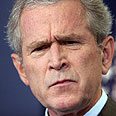
Bush warns of 'holocaust' if Iran gets nukes
US president also demands Tehran end support for extremists in Iraq. 'Iran's actions threaten the security of nations everywhere, and the United States is rallying friends and allies to isolate Iran's regime, to impose economic sanctions,' he tells American Legion veterans group
"Iran's actions threaten the security of nations everywhere, and the United States is rallying friends and allies to isolate Iran's regime, to impose economic sanctions," he told the American Legion veterans group.
"We will confront this danger before it is too late," vowed Bush, who has pressed for tougher international sanctions and said he hopes for a diplomatic solution but has repeatedly refused to rule out the use of force.
Bush, whose speech was billed a defense of US efforts in Iraq, also said Tehran must starve Shiite fighters in Iraq of weapons, equipment and training whether or not Iran's leaders know about such operations and have given their blessing.
"Either way, they cannot escape responsibility for aiding attacks against coalition forces and the murder of innocent Iraqis," he said, as the White House warned in a statement that Iran must act "at once."
Bush also strongly defended US-led efforts in Iraq and especially his decision in January to send another 30,000 US troops there, describing the unpopular conflict as the central front against Iran and al-Qaeda.
"The most important and immediate way to counter the ambitions of al-Qaeda and Iran and other forces of instability and terror is to win the fight in Iraq," he declared.
Bush said there were "unmistakable signs" that the US troop "surge" was paying off with lower levels of violence and local efforts at quieting bloody sectarian conflict and downplayed the failure by the government in Baghdad to post concrete progress on national reconciliation.
"Iraq's leaders aren't perfect, but they were elected by their people," he said. "And leaders in Washington need to look for ways to help our Iraqi allies succeed, not excuses for abandoning them."
Iran: There will be a power vacuum in region
Shortly before Bush spoke, Iranian President Mahmoud Ahmadinejad said Iran and neighboring countries were ready to fill the "power vacuum" emerging in the Middle East as US power in Iraq wanes.
"You (the United States) cannot preserve your power over Iraq with a few tanks, artillery and weapons. Today, you are prisoners of your own quagmire. You have no choice but to accept the rights of the Iraqi people," Ahmadinejad said.
"I can tell you there will be a power vacuum in the region. We are ready with other regional countries, such as Saudi Arabia, and the people of Iraq, to fill this vacuum."
The United States has expressed its discomfort over the increasingly strong relationship between Iran and Baghdad.
Some western analysts have argued that Iran has been the chief beneficiary of the US invasion that toppled Saddam Hussein in 2003, helping Tehran to boost its influence in the region.
Ahmadinejad also scoffed at the notion of a US attack on his country dismissed a warning from his new French counterpart, Nicolas Sarkozy, as a symptom of inexperience.
"There is no ... possibility of such an attack by the United States," Ahmadinejad told a news conference marked by his characteristic defiance.
"Even if they take such a decision, they cannot implement it," he said.
Sarkozy used a keynote foreign policy address on Monday to say the threat of sanctions coupled with an offer of dialogue was the only way of avoiding a "catastrophic alternative: an Iranian bomb or the bombing of Iran."
"He only recently came to power and wants to find a place for himself in the world," Ahmadinejad said of the French president. "He is still inexperienced, meaning that maybe he does not really understand the meaning of his own words."
'Iran is a nuclear nation'
The United States accuses Iran - OPEC's number two oil producer and owner of the second largest proven gas reserves in the world - of seeking to make nuclear weapons under the guise of a civilian energy drive.
Iran insists that the drive is entirely peaceful and that its growing population will need nuclear power as fossil fuels start to run dry.
Tehran's refusal to suspend uranium enrichment - a sensitive process that can be used both to make nuclear fuel and nuclear weapons - has already seen it slapped with two sets of UN sanctions.
Washington has been pushing for tougher measures, but Ahmadinejad said Iran was now cooperating so well with the UN nuclear watchdog, the International Atomic Energy Agency (IAEA), that more UN sanctions were unlikely.
"Not one member of the IAEA has cooperated as well as Iran. So from our point of view, Iran's nuclear case is closed. Iran is a nuclear nation and has the nuclear fuel cycle," he said.
A deal reached between Iran and the IAEA last week sets out a detailed timetable for Tehran to answer outstanding questions about its atomic drive, but does not tackle the key sticking point over whether Iran should suspend uranium enrichment activities.
The US envoy to the IAEA, Gregory Schulte, has dismissed the plan as having "real limitations," and claimed that Iran "is clearly trying to distract attention from its continued development of bomb-making capability."
Schulte insisted that the United States would continue pushing for a third round of sanctions, which diplomats said Washington wanted to happen in September.















